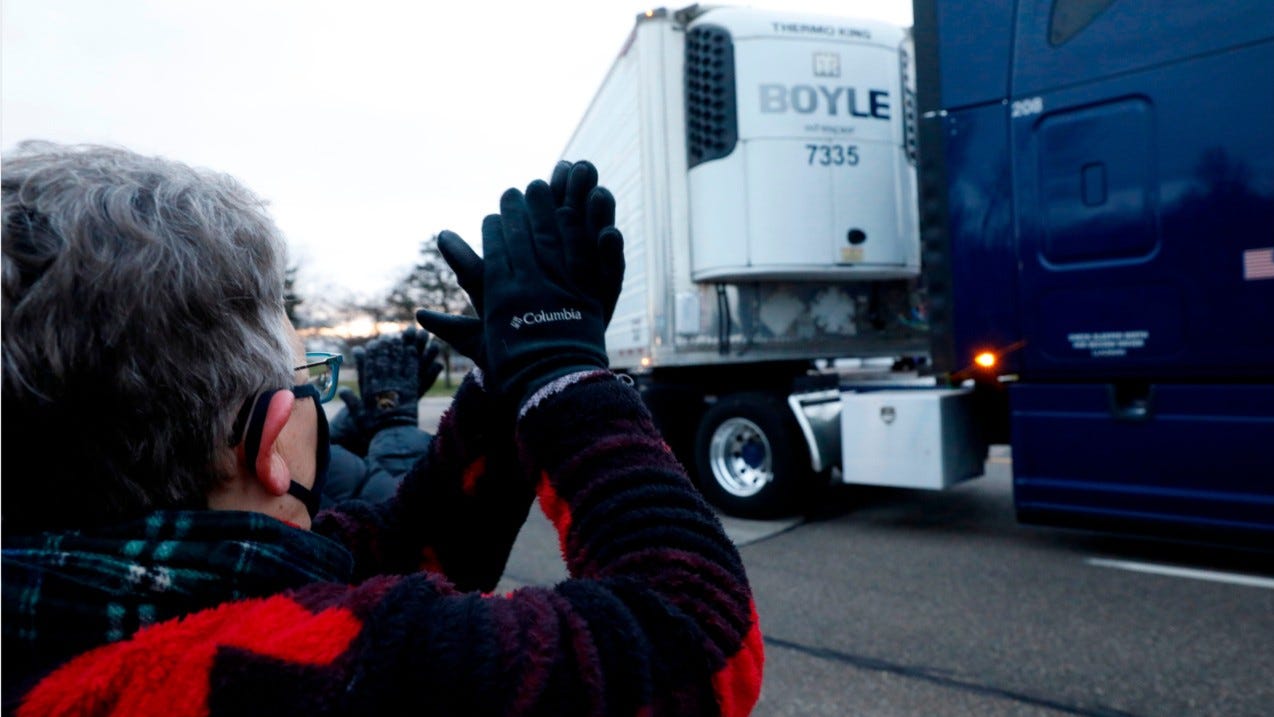By Reagan Payne
With COVID-19 continuing to ravage the country, the American public is excited to learn the U.S. Food and Drug Administration (FDA) authorized a vaccine for the prevention of the virus. As to be expected, truck drivers will be on the front lines of delivering this shot to the masses.
This development comes just in time as the nation's COVID-19 death toll hit 300,000 this Sunday. Deliveries will be staggered in arrival at 145 distribution centers Monday, another 425 sites getting shipments Tuesday, and the remaining 66 locations supplied on Wednesday.
This is the biggest vaccination effort in our country's history, totaling 636 predetermined delivery locations. These deliveries will total almost 3 million doses and many more to come.
Crowds gathered in Portage, Mich., yesterday to watch the first roll-out of vaccines leave the Pfizer facility. The trucks were escorted by U.S. Marshals to ensure their safe arrival to airports and other distribution facilities. While rightful excitement ensues, there are still concerns being considered with trucking capacities and who will first receive these vaccines.
“In the motor transportation segment, it’s the tightest capacity environment I’ve experienced in my career,†Andrew Boyle, Co-President of Boyle Transportation, said in a CNBC interview Monday.
His company already has federal defense clearances and the experience necessary for transporting these below-zero vaccines.
“At the same time, we have a spike of demand," Boyle continued. "We’re going to be as efficient as possible, try to create as much capacity as possible with weekend shipping, etc. We’re prioritizing this type of cargo.â€
Hitting home
Personal connections to this effort are evident everywhere. FedEx package handler Bruce Smith shares his personal connection from the Grand Rapids Airport. His older sister died at the hands of the virus in May; his nephew is still battling symptoms from his infection.
“I think she would be ecstatic to know that something that has ravaged our family ... that a family member is going to be part of such a big project,†said Smith. “It is very, very important.â€
Healthcare workers on the front lines of caring for those infected with the virus are the very first to receive the vaccine. Second doses are also being reserved for the booster shot required three weeks after the initial immunization.
Individuals living in long-term care homes are in line right behind healthcare individuals. Ultimately, however, these choices are up to individual states. States are expected to follow federal guidelines, but there may be more differentiation later in the administration of vaccines.
All the hard work and extra hours the trucking industry has put into making this vaccine available almost deserves a high-priority spot in receiving it themselves; trucking industry leaders have advocated for such. Besides, how could the shots make their way across the country without the health and wellness of those transporting them?
“There’s a much larger problem for anyone if those industries break down,†said Nancy Kass, a bioethicist from Johns Hopkins University, told Heavy Duty Trucking. “When certain sectors are either unable to work because of illness, or unable to work because of a fear of becoming ill, it’s bad for all of us.â€
Reagan Payne is a staff writer for Wright Media. She can be reached at rpayne@wrightmediacorp.com


Leave a Reply
Your email address will not be published. Required fields are marked *